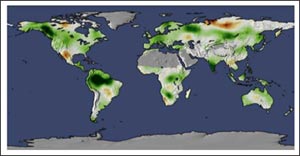Ecology, The Environment and Conservation
This complex theme deals primarily with interactions between organisms and the environmental factors that impact them, but to a greater extent between individual inanimate environmental factors.
innovations-report offers informative reports and articles on topics such as climate protection, landscape conservation, ecological systems, wildlife and nature parks and ecosystem efficiency and balance.

Journey back through time to help manage river floods
Statistically, there is little likelihood of anybody experiencing a major river flood whose average recurrence interval is one hundred or one thousand years. Predicting and designing of such events involves going back in time, three or four centuries, by scrutinising records of severe flooding. Joint researches by Cemagref hydrologist Michel Lang and historian Denis Coeur have reconstructed the history of three French rivers, the Guiers, Isere and Ardeche, a unique picture which has been incorporated

Are drugs harmful for the environment?
Medicines released into the environment may be a risk to living species in the long term. Jeanne Garric’s ecotoxicology team at Cemagref Lyon has shown that certain molecules disrupt reproduction, embryo development and growth of representative organisms in aquatic environments. Toxicity tests have been conducted in the laboratory on Daphnia, Rotifera and zebra fish under standard protocols. Active pharmaceuticals ingredients (APIs) concentrations in the environment however are found to be 1000 to 10

Anthropologist Predicts Major Threat to Species Within 50 Years
If the world’s human population continues to rise at its current rate, the planet will increase the numbers of threatened species at least 7 percent worldwide in the next 20 years and twice that many by the year 2050.
In a recent model of the impact human population growth has on biological diversity, Ohio State University anthropologist Jeffrey McKee and his colleagues warn that the United States alone will add at least 10 additional species to the “threatened” list within 50 years.

Global Garden Grows Greener
A NASA-Department of Energy jointly funded study concludes the Earth has been greening over the past 20 years. As climate changed, plants found it easier to grow.
The globally comprehensive, multi-discipline study appears in this week’s Science magazine. The article states climate changes have provided extra doses of water, heat and sunlight in areas where one or more of those ingredients may have been lacking. Plants flourished in places where climatic conditions previously limited gro

Ancient pollen yields insight into forest biodiversity
By analyzing data on tree pollen extracted from ancient lake sediments, ecologists have sharpened the understanding of how forests can maintain a diversity of species. Their findings indicate that stabilizing processes have been more important than previously thought, and that the human-caused loss of species could upset that stability in ways that remain poorly understood.
“Quantifying the link between stability and diversity, and identifying the factors that promote species diversity, ha

Engineering a solution to waste crisis
Engineers at Cardiff University, UK, are using the latest technology to update a time-honoured practice – and turn a serious environmental problem into a valuable resource.
Modern industrial societies generate vast quantities of waste – the UK alone produces more than a million tonnes every day. A large proportion of it has traditionally been put into “landfill” – literally dumped into large holes in the land, but space is running out and the damage to the environment from landfill sites is